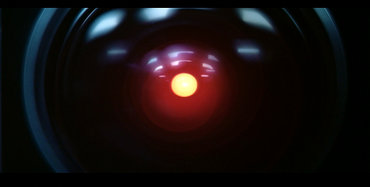This house
 This house may be spying on me.
This house may be spying on me.
I know it listens. Its owners say, "Google, set the timer for one minute," and a male voice sounds: "Setting the timer for one minute."
I think, one minute? You need a timer for one minute? Does everyone now cook that precisely?
They say, "Google, turn on the lamp in the family room." The voice sounds: "Turning on the lamp in the family room." The lamp is literally sitting on the table right next to the person issuing the order.
I think, "Arm, hand, switch, flick. No?"
This happens every night because the lamp is programmed to turn off earlier than we go to bed.
I do not feel I am visiting the future. Instead, I feel I am visiting an experiment that years from now people will look back on and say, "Why did they do that?"
I know by feel how long a minute is. A child growing up in this house would not. That child may not even know how to operate a light switch, even though one of the house's owners is a technical support guy who knows how to build and dismember computers, write code, and wire circuits. Later, this house's owner tells me, "I just wanted a reminder."
It's 16 years since I visited Microsoft's and IBM's visions of the smart homes they thought we might be living in by now. IBM imagined voice commands; Microsoft imagined fashion advice-giving closets. The better parts of the vision - IBM's dashboard with a tick-box so your lawn watering system would observe the latest municipal watering restrictions - are sadly unavailable. The worse parts - living in constant near-darkness so the ubiquitous projections are readable - are sadly closer. Neither envisioned giant competitors whose interests are served by installing in-house microphones on constant alert.
This house inaudibly alerts its owner's phones whenever anyone approaches the front door. From my perspective, new people mysteriously appear in the kitchen without warning.
This house has smartish thermostats that display little wifi icons to indicate that they're online. This house's owners tell me these are Ecobee Linux thermostats; the wifi connection lets them control the heating from their phones. The thermostats are not connected to Google.
None of this is obviously intrusive. This house looks basically like a normal house. The pile of electronics in the basement is just a pile of electronics. Pay no attention to the small blue flashing lights behind the black fascia.
One of this house's owners tells me he has deliberately chosen a male voice for the smart speaker so as not to suggest that women are or should be subservient to men. Both owners are answered by the same male voice. I can imagine personalized voices might be useful for distinguishing who asked what, particularly in a shared house or a company, and ensuring only the right people got to issue orders. Google says its speakers can be trained to recognize six unique voices - a feature I can see would be valuable to the company as a vector for gathering more detailed information about each user's personality and profile. And, yes, it would serve users better.
Right now, I could come down in the middle of the night and say, "Google, turn on the lights in the master bedroom." I actually did something like this once by accident years ago in a friend's apartment that was wirelessed up with X10 controls. I know this system would allow it because I used the word "Google" carelessly in a sentence while standing next to a digital photo frame, and the unexpected speaker inside it woke up to say, "I don't understand". This house's owner stared: "It's not supposed to do that when Google is not the first word in the sentence". The photo frame stayed silent.
I think it was just marking its territory.
Turning off the fan in their bedroom would be more subtle. They would wake up more slowly, and would probably just think the fan had broken. This house will need reprogramming to protect itself from children. Once that happens, guests will be unable to do anything for themselves.
This house's owners tell me there are many upgrades they could implement, and they will but: managing them needs skill and thought to segment and secure the network and implement local data storage. Keeping Google and Amazon at bay requires an expert.
This house's owners do not get their news from their smart speakers, but it may be only a matter of time. At a recent Hacks/Hackers, Nic Newman gave the findings of a recent Reuters Institute study: smart speakers are growing faster than smartphones at the same stage, they are replacing radios, and "will kill the remote control". So far, only 46% use them to get news updates. What was alarming was the gatekeeper control providers have: on a computer, the web could offer 20 links; on a smartphone there's room for seven, voice...one. Just one answer to, "What's the latest news on the US presidential race?"
At OpenTech in 2017, Tom Steinberg observed that now that his house was equipped with an Amazon Echo, homes without one seemed "broken". He predicted that this would become such a fundamental technology that "only billionaires will be able to opt out". Yet really, the biggest advance since the beginning of remote controls is that now your garage door opener can collect your data and send it to Google.
My house can stay "broken".
Illustrations: HAL (what else?).
Wendy M. Grossman is the 2013 winner of the Enigma Award. Her Web site has an extensive archive of her books, articles, and music, and an archive of earlier columns in this series. Stories about the border wars between cyberspace and real life are posted occasionally during the week at the net.wars Pinboard - or follow on Twitter.